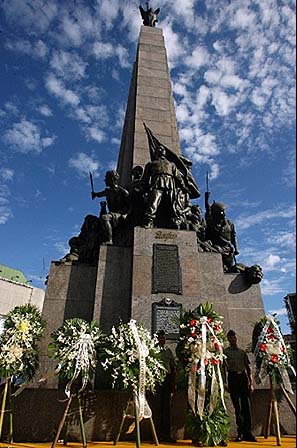Brothers under the skin
NEW YORK – This November 30th marks the 149th birth anniversary of Andres Bonifacio, the charismatic founder of the Kataas-taasang Kagalanggalangang Katipunan ng Mga Anak ng Bayan (KKK, or the Highest, Most Honorable Society of the Country’s Sons and Daughters). Tondo-born, working-class Bonifacio, an admirer of the upper-class ilustrado José Rizal, only two years his senior, had joined La Liga Filipina (the Philippine League), which the latter had formed in 1892, shortly after his return from Europe. Rizal meant to disseminate through La Liga what the Propaganda Movement had been advocating in Spain: the unification of the archipelago politically and culturally; a more methodical development of agriculture, education, and industry; and the eradication of injustice. These reformist goals were to be pursued in a nonviolent manner. But despite the fact that these stated objectives could hardly be seen as radical—there was no mention of forming a state independent of the Spanish—the very fact that it had been founded by Rizal, whom the friars hated virulently, was enough to doom it. Just four days after the initial meeting of La Liga, Rizal was arrested and subsequently exiled on July 15, 1892, to Dapitan, in northwestern Mindanao.
For a while, Bonifacio actively recruited members for the League. Fearful, however, that the recruits brought in by the warehouseman—Bonifacio was employed by a British trading firm—saw armed revolution as the only path forward, the remaining leaders of La Liga dissolved the organization. Thus, from its ashes sprang the Katipunan.
Not only was Bonifacio familiar with Rizal’s novels, Noli Me Tangere and El Filibusterismo, he had also read Victor Hugo’s Les Miserables, Eugene Sue’s The Wandering Jew, as well as texts on the French Revolution and international law. Inspired doubtless by the advocacy of liberté, egalité and fraternité through the barrel of a gun (and the guillotine), and the subsequent overthrow of the long-entrenched monarchical order, Bonifacio envisioned a similar scenario in getting rid of the tyrannical Spanish. Yes, he deeply admired and respected Rizal but he saw how the man had been treated by the colonial state—most likely the turning point that made him take the path Rizal had forsworn. The KKK would be the irresistible catalyst that would put an end to Iberian despotism, friar abuse, and establish a new and independent nation.

The commemoration of Bonifacio’s birth will no doubt witness a vigorous debate yet again as to who should be preeminent in our esteem: Rizal or Bonifacio. The latter is put forward in many ways as the anti-Rizal: a nationalist working-class firebrand willing to risk all to attain freedom, consequences be damned, as opposed to the measured intellectual assessment of the former, a privileged member of indio society. While this debate does throw up interesting points well worth pondering, in the long run, it is at heart a false one. Is our esteem so limited that to honor one is to necessarily exclude the other? An absurd proposition but one that in fact continues to be advanced to this day.
Both men gave their lives for a greater cause. Both men knew and respected each other, though at that point Rizal was the more celebrated and influential of the two. In acknowledgement,
Bonifacio sent an emissary, Dr. Pio Valenzuela, to Dapitan to seek Dr. Rizal’s advice, and his blessing for the armed revolution that was being planned. Rizal thought the timing wasn’t right and therefore, not wishing the blood of Filipinos on his conscience, advised against it. The Katipunan chief was sorely disappointed but this didn’t seem to lessen the esteem in which he held the exile, one proof of this being the continued use of “Rizal” as a Katipunan password.
Instead of an either/or framework, let us instead reimagine the two as the impoverished Elias and the wealthy Ibarra, in Rizal’s Noli, who carry on a debate over the justification of violent actions against the state, which Elias favors and Ibarra argues against. At the end of the novel, Elìas sacrifices his life that Ibarra may live. By the time we meet Ibarra again in the Fili (really a sequel to the Noli), he has changed his tune completely and now seeks the violent overthrow of the state.
It’s almost as though life were imitating art. Just as one cannot think of Ibarra without thinking of Elìas, and vice versa, similarly, to contemplate the 1896 Revolution is to see the lives of Rizal and Bonifacio intertwined. To honor one is to also honor the other.